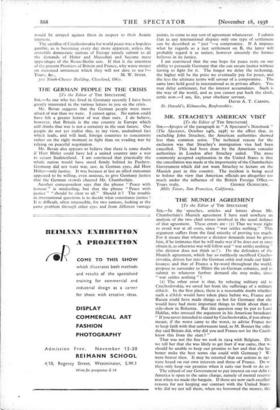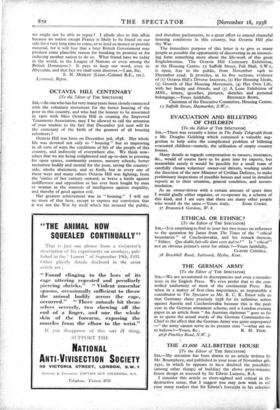THE MUNICH AGREEMENT
[To the Editor of THE SPECTATOR] SIR,—In the speeches, articles and letters about Mr. Chamberlain's Munich agreement I have read nowhere an analysis of the two chief errors involved in the usual defence of that agreement. These errors are : (t) That we were right to avoid war at all costs, since " war settles nothing." This argument suffers from the fatal mistake of proving too much. For it means that whatever a dictator demands must be given him, if he intimates that he will make war if he does not at once obtain it, as otherwise war will follow and " war settles nothing " (the dictator does not think so ! ). Do the defenders of the Munich agreement, which has' so ruthlessly sacrificed Czecho- slovakia, driven her into the German orbit and made our faith- lessness and that of France a by-word throughout the world, propose to surrender to Hitler the ex-German colonies, and to submit to whatever further demand she may make, since " war settles nothing " ?
(2) The other error is that, by refusing military aid to Czechoslovakia, we saved her from the sufferings of a military debdcle. In the first place, there is a reasonable doubt whether such a dibdcle would have taken place before we, France and Russia could have made things so hot for Germany that she would have had more important things to think about than a side-show in Bohemia. But this question may be put to Lord Halifax, who stressed the argument in his American broadcast, " If you never intended to stand by Czechoslovakia, if you always meant, if the worst came to the worst, to advise France not to keep faith with that unfortunate land, as M. Bonnet the other day said Britain did, why did you and France not let the Czech, know this from the start ? "
That was not the line we took in 1914 with Belgium. Did we tell her that she was likely to get hurt if war came, that wt should be unable to keep our promise to her and that she ha( better make the best terms she could with Germany ? were braver then. It may be retorted that our actions in 191 were based on our own interests and those of France. Do then only keep our promise when it suits our book to do s
The refusal of our Government to pay interest on our debt t America is open to the same charge, namely of mental reserva tion when we made the bargain. If there are now such excellent reasons for not keeping our contract with the United States, why did we not tell them, when we borrowed the money, that
we might not be able to repay.? I allude also to this affair because no nation except France is likely to be found on our side for a very long time to come, or to lend us money or provide material, for it will fear that a later British Government may produce some plausible reason for breaking-its promise or for inducing another nation to do so. What friend have we today in the world, in the League of Nations or even among the British Dominions ? It pays to keep our word, even to Abyssinia, and that fact we shall soon discover.--Lam, Sir, E. N. MOZLEY (Lieut.-Colonel R.E., ret.). Lynwood, Ripon.

























































 Previous page
Previous page